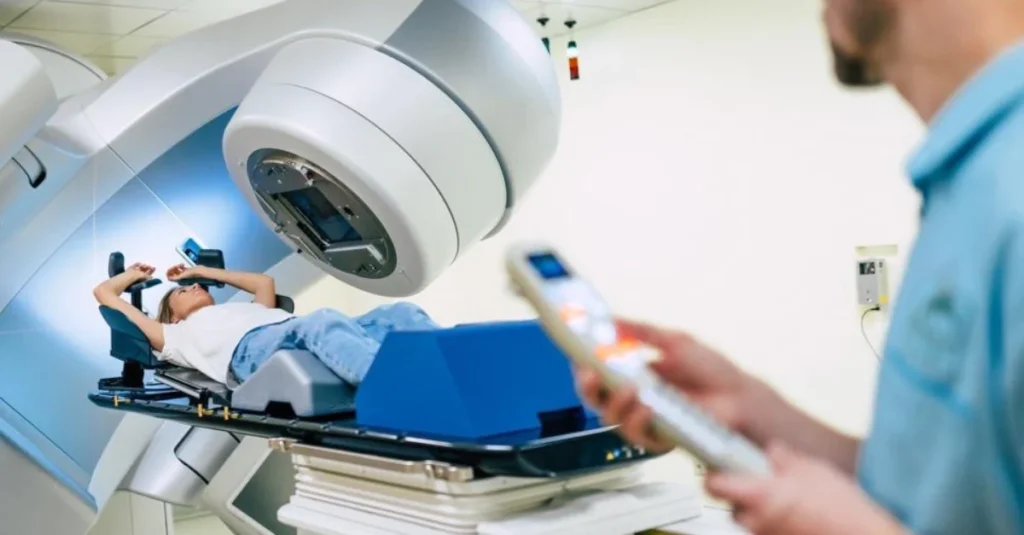Overview
Oncology has always been at the forefront of medical research, but in 2025, it is more than just a field of study—it is a booming industry, a driver of innovation, and a critical area for investment. The global cancer burden continues to rise, with cases expected to reach nearly 30 million annually by 2040. Yet, as treatments advance, a new reality is emerging: oncology is not just about survival—it is about quality of life, accessibility, and the economics of care.

The AI Revolution: Faster Drug Development, Higher Stakes
One of the most significant shifts in oncology is the use of artificial intelligence in drug discovery. AI-driven models can now identify potential cancer-fighting compounds in a fraction of the time it took just five years ago. Companies like DeepMind and Insilico Medicine are using machine learning to analyze genetic mutations and predict which drugs will be most effective.
This shift is not just about speed—it’s about cost. The traditional drug development cycle takes 10-15 years and costs billions of dollars. AI is cutting that timeline in half, allowing biotech firms to bring targeted therapies to market faster. But with increased speed comes increased competition, forcing pharmaceutical companies to rethink their business models. The winners will be those who can balance rapid innovation with regulatory approval, ensuring both efficacy and safety.
For business leaders, investors, and innovators, the landscape of oncology in 2025 presents both challenges and opportunities. From AI-driven drug discovery to personalized cancer vaccines, the industry is undergoing a transformation that will have ripple effects across healthcare, technology, and even the workplace.
The AI Revolution: Faster Drug Development, Higher Stakes
One of the most significant shifts in oncology is the use of artificial intelligence in drug discovery. AI-driven models can now identify potential cancer-fighting compounds in a fraction of the time it took just five years ago. Companies like DeepMind and Insilico Medicine are using machine learning to analyze genetic mutations and predict which drugs will be most effective.
This shift is not just about speed—it’s about cost. The traditional drug development cycle takes 10-15 years and costs billions of dollars. AI is cutting that timeline in half, allowing biotech firms to bring targeted therapies to market faster. But with increased speed comes increased competition, forcing pharmaceutical companies to rethink their business models. The winners will be those who can balance rapid innovation with regulatory approval, ensuring both efficacy and safety.


Personalized Cancer Vaccines: The Next Big Breakthrough?
mRNA technology, which gained worldwide attention during the COVID-19 pandemic, is now being harnessed for oncology. Companies like Moderna and BioNTech are developing personalized cancer vaccines that use a patient’s own tumor DNA to create a targeted immune response. Early trials have shown promise, with some patients experiencing long-term remission.
The implications are massive—not just for patient outcomes but for the entire healthcare system. Traditional chemotherapy and radiation treatments are expensive, invasive, and often come with severe side effects. If cancer vaccines can reduce the need for these therapies, the cost of cancer care could decrease significantly. However, the high price of personalized medicine remains a barrier, raising questions about who will have access to these life-saving treatments.
The Investment Boom: Where is the Smart Money Going?
With oncology innovation accelerating, venture capital and private equity firms are pouring billions into biotech startups. The focus areas for investment in 2025 include:
Liquid biopsies – Non-invasive blood tests that detect cancer before symptoms appear
CAR-T therapy advancements – Engineering a patient’s own immune cells to fight cancer more effectively
Nano-medicine – Using tiny particles to deliver drugs directly to cancer cells, reducing side effects
Despite the promise, the oncology investment landscape is not without risks. Regulatory hurdles, clinical trial failures, and high R&D costs mean that not every startup will succeed. Investors must navigate a complex landscape where scientific breakthroughs must align with commercial viability.
Looking Ahead: The Ethics of Cancer Innovation
As with any technological revolution, ethical questions are emerging. Who will have access to personalized cancer treatments? How can healthcare systems balance cost and innovation? Will AI-driven drug discovery lead to unforeseen risks?
These are questions that business leaders, policymakers, and investors must grapple with as oncology continues to evolve.
One thing is certain: cancer care in 2025 is not just about medicine—it’s about technology, economics, and the future of work.
As innovation accelerates, how can business leaders ensure that the benefits of oncology’s breakthroughs reach everyone—not just those who can afford them?




